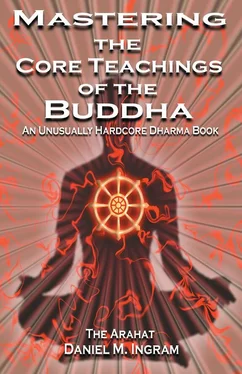Daniel Ingram - Mastering the Core Teachings of Buddha - An Unusually Hardcore Dharma Book
Здесь есть возможность читать онлайн «Daniel Ingram - Mastering the Core Teachings of Buddha - An Unusually Hardcore Dharma Book» весь текст электронной книги совершенно бесплатно (целиком полную версию без сокращений). В некоторых случаях можно слушать аудио, скачать через торрент в формате fb2 и присутствует краткое содержание. Год выпуска: 2009, ISBN: 2009, Издательство: Aeon Books, Жанр: Старинная литература, на русском языке. Описание произведения, (предисловие) а так же отзывы посетителей доступны на портале библиотеки ЛибКат.
- Название:Mastering the Core Teachings of Buddha - An Unusually Hardcore Dharma Book
- Автор:
- Издательство:Aeon Books
- Жанр:
- Год:2009
- ISBN:9781904658405
- Рейтинг книги:5 / 5. Голосов: 1
-
Избранное:Добавить в избранное
- Отзывы:
-
Ваша оценка:
- 100
- 1
- 2
- 3
- 4
- 5
Mastering the Core Teachings of Buddha - An Unusually Hardcore Dharma Book: краткое содержание, описание и аннотация
Предлагаем к чтению аннотацию, описание, краткое содержание или предисловие (зависит от того, что написал сам автор книги «Mastering the Core Teachings of Buddha - An Unusually Hardcore Dharma Book»). Если вы не нашли необходимую информацию о книге — напишите в комментариях, мы постараемся отыскать её.
Mastering the Core Teachings of Buddha - An Unusually Hardcore Dharma Book — читать онлайн бесплатно полную книгу (весь текст) целиком
Ниже представлен текст книги, разбитый по страницам. Система сохранения места последней прочитанной страницы, позволяет с удобством читать онлайн бесплатно книгу «Mastering the Core Teachings of Buddha - An Unusually Hardcore Dharma Book», без необходимости каждый раз заново искать на чём Вы остановились. Поставьте закладку, и сможете в любой момент перейти на страницу, на которой закончили чтение.
Интервал:
Закладка:
16. Immortality Models: those that involve living forever, usually in an amazing place (Heaven, Nirvana, Pure Land, etc.) or in an enhanced state of ability (Angels, Bodhisattvas, Sorcerers, etc.).
17. Transcendence Models: those models that state that one will be free from or somehow above the travails of the world while yet being in the world, and thus live in a state of transcendence.
18. Extinction Models: those that involve getting off of the Wheel of Suffering, the round of rebirths, etc. and thus never being reborn again or even ceasing to be at the moment of enlightenment, that is, the great
“Poof!” on the cushion, not to be confused with the more mundane atmospheric consequences of a legume-based diet, as anyone who as been on a vegetarian meditation retreat knows all too well.
19. Love Models: those that involve us loving everyone and/or everyone loving us.
20. Unitive Models: that you will become one with everything in some sense.
21. Social Models: that you will somehow be accepted for what you may have attained, that you have attained something when people think you have, and variants on these themes.
Like me, you have probably run into most or all of these ideals of awakening in your spiritual quest and probably within yourself at some point in time, either consciously or unconsciously. Given all of these high ideals, it is not surprising that we find the task of awakening daunting if not preposterous. Imagine yourself as the universally-accepted radiant immortal angel bodhisattva bright-eyed yoga-butt-having all-loving one-with-the-universe endlessly mindful perfectly healthy emotionally perfected psychologically pure endlessly altruistic non-thinking desire-free psychic-superhero star-child of light, and then notice how this image may be in some contrast with your current life. If you are anything like me, you may notice a bit of a discrepancy!
267
Models of the Stages of Enlightenment
I will take on each model, relate them to a few of the traditions, and try to make sense of where these ideals came from. I will also address which ones are realistic and which are just a bunch of beautiful dreams that can either help you identify areas to work on or really screw up your spiritual quest if you are not careful. You will note that none of these models come from any formal tradition. In order to relate them to the traditions, here is a list of some models from Buddhism: 1. The Four Path Model from the Theravada, which involves becoming a stream-enterer, second path, third path and then an arahat (however you spell it).
2. The Five Path Model from the Tibetans.
3. The Ten Bodhisattva Bhumis from the Tibetans.
4. The ideal of Buddhahood from all the Buddhist traditions.
5. The Sudden and Gradual Awakening schools of Zen.
There are other models from other traditions (e.g. St. John of the Cross’ Ladder of Love), and I have already mentioned these in the section on the Progress of Insight. I’m not going to go into much detail about them here, but when you are familiar with the models I am going to discuss you should be able to make some sense of them.
THE NON-DUALITY MODEL
The Non-Duality Model is without doubt my favorite of them all. It essentially says that the goal is to stop a process of identification that turns some patterns of sensations into a Doer, Perceiver, Center Point, Soul, Agent or Self in some very fundamental perceptual way. By seeing these sensations as they are the process can gradually be seen through until one day there are no more sensations that trick the mind in this way. My favorite quote that articulates this model is the one that goes something like, “In the seeing just the seen, in the hearing just the heard, in the thinking just the thought,” and thus I may repeat this quote a few times just to make the point of how profound it is. Basically, there is just a field of sensations, as there was before, but now all of these sensations are progressively just seen to be as they are, and all the sensations that we generally call “me” are just a part of this process.
This model does not imply anything else, promises nothing related to any other models except in some loose way the Fundamental Perception Model that I will talk about shortly. The Non-Duality Model 268
Models of the Stages of Enlightenment is the one of the most practical models for practice, in that it focuses on simply seeing things as they are right now.
I will talk more about this model as we go, and have already talked about it often in a less direct way. I present it first to serve as a foil or counterpoint to all of the other models, and it is the only model that can withstand reality testing without qualification or difficulty. All of the other models may contain some degree of truth somewhere in them, either literally or poetically, but this one you can hang your hat on all the way through. This awareness develops gradually with some sharp jumps along the way, leading to the endless debates about sudden and gradual schools of awakening, a subject that will hopefully become more clear as we go, but probably deserves some mention here.
THE SUDDEN SCHOOLS OF AWAKENING
There are schools of awakening, particularly some Zen (Chan) traditions from China and Korea, and some interpretations of Hinduism, though this is not a complete list, that say that awakening happens in one big shift and that’s basically it, regardless of exactly how you define “it”. They deny the claims of the progressive schools (Theravada, Tibetans, some other strains of Zen, most schools of Sufism, Qabala, other Western Traditions, etc.) that there is mappable territory before awakening and that there might be lots to do after stream entry or whatever you want to call it. Possible explanations for these schools include:
1. There may be a few rare individuals that somehow manage to go straight to full awakening due to whatever interesting way they are wired or practiced, though I have never met anyone who did this.
2. There may be schools founded or influenced by people who got to the first stage of awakening and somehow never realized there could be anything more than that or got trapped in a lie about being fully awakened when they hadn’t yet realized there was more to go and never retracted their initial, erroneous claim.
3. There are people who just thought that was the dogma somehow and stuck with it regardless of any issues of actually having insight.
4. Other explanations I haven’t thought of or run across.
269
Models of the Stages of Enlightenment
Being as every single person I have ever known has followed a progressive path, including myself, it is very hard for me to believe the sudden claims except for keeping open the possibility that there may be the exceedingly rare practitioner who occasionally manages to pull this off and thus imagines based on their limited experience that this is how it happens in general. In short, if you manage to do this, more power to you, and please let me know. Otherwise, I would bet on the gradual, progressive schools, and if you attain something that you are pretty impressed by, give it time to see how it holds up when the troubles of the world come knocking at your door over the months and years after that shift of perspective.
THE FUNDAMENTAL PERCEPTION MODELS
Related to the Non-Duality Model, and also useful for practice, are the Fundamental Perception Models. I say models here because various traditions emphasize different qualities of reality as being essential. For instance, the Theravada uses the Three Characteristics of
Impermanence, Suffering and No-Self, as you already know well by this point. The Mahayana traditions (Tibetans in particular), may emphasize Shunyata or emptiness, and the Vajrayana traditions may emphasize luminosity or the space-like meditative equipoise of Dzogchen. They may also talk about Maha Ati, or express fundamental truths in some other way.
Читать дальшеИнтервал:
Закладка:
Похожие книги на «Mastering the Core Teachings of Buddha - An Unusually Hardcore Dharma Book»
Представляем Вашему вниманию похожие книги на «Mastering the Core Teachings of Buddha - An Unusually Hardcore Dharma Book» списком для выбора. Мы отобрали схожую по названию и смыслу литературу в надежде предоставить читателям больше вариантов отыскать новые, интересные, ещё непрочитанные произведения.
Обсуждение, отзывы о книге «Mastering the Core Teachings of Buddha - An Unusually Hardcore Dharma Book» и просто собственные мнения читателей. Оставьте ваши комментарии, напишите, что Вы думаете о произведении, его смысле или главных героях. Укажите что конкретно понравилось, а что нет, и почему Вы так считаете.












